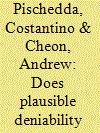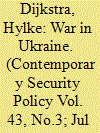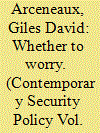|
|
|
Sort Order |
|
|
|
Items / Page
|
|
|
|
|
|
|
| Srl | Item |
| 1 |
ID:
192519


|
|
|
|
|
| Summary/Abstract |
States conduct unclaimed coercive acts, imposing costs on adversaries to signal resolve but denying (or not claiming) responsibility. Some scholars posit that unclaimed acts have considerable potential to coerce targets, while containing escalation risks. Others suggest that unclaimed coercive efforts tend to fail and trigger escalation. We assess these competing perspectives about the effects of unclaimed attacks with a vignette experiment exposing US-based respondents to a scenario where, after Russia warns of unpredictable consequences if NATO continues providing weapons to Ukraine, an explosion occurs at a NATO base in Poland used to funnel weapons to Ukraine. Intelligence agencies and independent analysts identify Russia as the likely culprit, while not ruling out the possibility of an accident. We randomize whether Russia claimed or denied responsibility for the explosion and find that unclaimed acts have lower coercive leverage than claimed ones, but the two do not significantly differ in escalation risk.
|
|
|
|
|
|
|
|
|
|
|
|
|
|
|
|
| 2 |
ID:
188139


|
|
|
|
|
| Summary/Abstract |
The repercussions of Russia’s invasion of Ukraine are reverberating around the world. The multilateral and coordinated response of the international community to Russia’s unprovoked war in Ukraine was immediate and has been waged on multiple fronts. While the world’s major powers are focused on the best strategies to face the ongoing conflict, international humanitarian law and human rights law are violated every day in Ukraine. Innocent civilians are tortured, killed, or obliged to leave their city or country to avoid the worst atrocities, while civilian buildings and infrastructure are destroyed. This article examines the most relevant decisions adopted at the international level and identifies possible solutions to prosecute and punish international crimes perpetrated in Ukraine. International (criminal) law and cooperation between states and international organizations will play a crucial role in the fight against impunity for those responsible for the worst atrocities against the Ukrainian population.
|
|
|
|
|
|
|
|
|
|
|
|
|
|
|
|
| 3 |
ID:
186556


|
|
|
|
|
| Summary/Abstract |
On February 24, 2022, Russia invaded Ukraine. After the 2008 war in Georgia, the 2014 annexation of Crimea, and the continuous conflict in Donbas for nearly eight years, Russia's massive military buildup in the fall of 2021, including in Belarus, the actual invasion should not have come as a surprise. For many of us, it did. And the hostility and brutality since have been shocking.
|
|
|
|
|
|
|
|
|
|
|
|
|
|
|
|
| 4 |
ID:
189040


|
|
|
|
|
| Summary/Abstract |
Russia’s invasion of Ukraine has shocked Western observers. Seizures of territory, mass expulsions, and all-out assaults on Ukrainian culture hearken back to an earlier, darker era in European history—the era of empire. Indeed, the conflict may be the 21st century’s first imperial war. For President Vladimir Putin and many others in the Russian elite, Ukraine’s underlying provocation lay not so much in its aspiration to join NATO or the European Union, but in the very temerity it displayed in existing at all. Expressing ideas that are widespread among Russian thinkers and politicians, Putin has argued that Ukrainians and Russians are, as he put it in 2014, “one people, a single whole”—and that because he considers Ukraine part of Russia’s own historic patrimony, Moscow retains the right to conquer and reshape it with no regard for its inhabitants.
|
|
|
|
|
|
|
|
|
|
|
|
|
|
|
|
| 5 |
ID:
186962


|
|
|
|
|
| Summary/Abstract |
As the war in Ukraine becomes protracted, there is discourse comparing China and Russia as tyrannical states versus states based on the principles of democracy. However, while China appears to support Russia’s opposition to NATO’s eastward expansion, it abstained from voting on the resolution condemning Russia in the UN General Assembly, and, at the same time, China has shown consideration for Ukraine by saying that it values sovereignty and that Ukraine is no exception. China’s response seems by no means simple.
|
|
|
|
|
|
|
|
|
|
|
|
|
|
|
|
| 6 |
ID:
184553


|
|
|
|
|
| Summary/Abstract |
Russia’s military operation in Ukraine, illegal in terms of the pre-1990s
international law and probably a geopolitical miscalculation, has caused
a shock incomparable even with that of the 2003 American attack on Iraq
that was proudly baptised Operation Shock and Awe. Remarkably, neither
the twenty-year-long war in Afghanistan waged by the U.S. and its allies, nor
the destruction of Libya in 2011, nor the multiple military interventions in
Africa, nor even NATO’s bombardment of Serbia in 1999—the first unlawful
use of force in post-WWII Europe—have caused such anger. There is always
a whiff of racism in the fact that wars waged against people who have
chosen to be on the “wrong side of history” are not condemned by those
on “right side of history” as they must be. How did it happen that after the
fall of the Berlin Wall and reasonable expectations of a peaceful future, the
world found itself in a situation where the use of military force has become
nearly normal unless it is used against Europeans who chose the “right
side of history”? How and why, in the race towards “the end of history” the
|
|
|
|
|
|
|
|
|
|
|
|
|
|
|
|
| 7 |
ID:
192530


|
|
|
|
|
| Summary/Abstract |
Russia’s war in Ukraine directly speaks to a core theory in nuclear politics: the theory of the nuclear revolution. Whereas this theory argues that nuclear weapons inhibit conflict and competition in international politics, skeptics of the nuclear revolution argue that competition endures in a nuclear world, and that nuclear weapons can even enable such competition. This article argues that the Russia-Ukraine war challenges expectations of the theory of the nuclear revolution, while largely supporting arguments made by the nuclear revolution skeptics. Specifically, the article argues that the theory of the nuclear revolution cannot explain Russia’s use of nuclear threats to enable its conventional aggression, nor can it explain the ways in which Russia has developed its nuclear posture to provide a bargaining advantage in competitive risk-taking scenarios. These findings challenge the leading theory in the field of nuclear politics and yield policy implications for maintaining nuclear stability during crises.
|
|
|
|
|
|
|
|
|
|
|
|
|
|
|
|
|
|
|
|
|